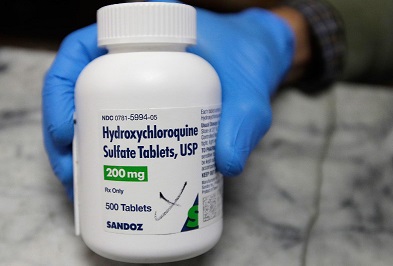COVID-19 News: Compassionate Use Of Hydroxychloroquine In The First COVID-19 Wave Caused The Deaths Of 16,990 Hospitalized Patients In Six Countries!
Nikhil Prasad Fact checked by:Thailand Medical News Teams Jan 03, 2024 1 year, 3 months, 1 week, 5 days, 20 hours, 8 minutes ago
COVID-19 News: The advent of the novel coronavirus, SARS-CoV-2, in December 2019 triggered a global pandemic that brought the world to a standstill. In the absence of specific treatments for COVID-19, the medical community turned to drug repurposing, exploring existing medications for potential efficacy against the virus. Hydroxychloroquine (HCQ), traditionally used to treat malaria and autoimmune diseases, emerged as a potential candidate, gaining attention despite a dearth of solid evidence supporting its effectiveness. This
COVID-19 News report delves into a comprehensive study conducted by researchers from Université Claude Bernard University of Lyon 1, shedding light on the compassionate use of HCQ during the initial wave of the pandemic and its alarming association with an increase in mortality rates.
 Hydroxychloroquine (HCQ) Which Should Never Be Used To Treat COVID-19!
Background
Hydroxychloroquine (HCQ) Which Should Never Be Used To Treat COVID-19!
Background
As the COVID-19 pandemic unfolded, medical professionals worldwide faced the daunting challenge of finding effective treatments for a rapidly spreading virus with severe health implications. In the quest for solutions, various existing drugs were repurposed based on their mechanisms of action against other pathogens. Hydroxychloroquine, known for its antimalarial and anti-rheumatic properties, emerged as a potential candidate due to its ability to inhibit viral replication.
However, the use of HCQ during the first wave of the pandemic was not without controversy. Despite limited evidence supporting its clinical benefits, HCQ was prescribed off-label for hospitalized COVID-19 patients. This practice raised concerns among the scientific community about the potential risks associated with the compassionate use of a drug with unclear efficacy.
Methods
The study conducted by researchers aimed to estimate the global impact of HCQ-related deaths during the initial wave of the COVID-19 pandemic. To achieve this, the researchers employed a meticulous methodology, combining data on mortality rates, HCQ exposure, the number of hospitalized patients, and the increased relative risk of death associated with HCQ. A meta-analysis of 44 cohort studies from six countries - Belgium, France, Italy, Spain, Turkey, and the USA – provided prevalence estimates, while dedicated databases offered information on the number of hospitalized patients.
Results
The study's findings illuminated a significant disparity in HCQ prescription rates across the six analyzed countries, ranging from 16% to 84%.
The researchers estimated a staggering 16,990 HCQ-related in-hospital deaths during the first wave of the pandemic in these countries. However, the researchers acknowledged the imprecision of these estimates due to limitations in data availability and variations in HCQ exposure rates.
/>
Discussion
Despite the study's limitations, including imprecise estimates in some countries and potential biases in HCQ exposure, the findings underscored the critical implications of compassionate drug use based on low-level evidence during a pandemic. The hazards associated with repurposing drugs without substantial evidence were vividly illustrated, emphasizing the urgent need for high-level evidence through rigorous randomized controlled trials.
Toxicity and Risks
The study delved into the toxicity associated with HCQ, particularly its correlation with cardiac side effects, including conduction disorders and QT interval prolongation. The RECOVERY trial, a pivotal randomized controlled trial, revealed an 8.2% risk of major cardiac arrhythmia related to HCQ in COVID-19 patients.
This raised substantial concerns about the safety of HCQ, particularly in the context of a disease where cardiac complications are already prevalent.
Other randomized trials investigating HCQ's efficacy reported adverse events, including hepatic and cardiac side effects, with a noteworthy 0.4% rate of fatal adverse events. The long-term use of HCQ in treating rheumatoid arthritis was associated with a heightened risk of major adverse cardiovascular events, further highlighting the potential dangers of its use.
Global Impact and Policy Implications
The study's main finding, estimating 16,990 HCQ-related deaths during the first wave, underscored the potential dangers associated with off-label drug use during a pandemic. The article shed light on the role of public authorities, scientific communities, and health agencies in either promoting or restricting drug prescriptions.
The study cited examples of widespread HCQ use based on preliminary reports, with subsequent retractions illustrating the challenges faced in disseminating accurate information during a rapidly evolving crisis. The rush to prescribe HCQ was not confined to a single country; it was a global phenomenon, further emphasizing the need for coordinated and evidence-based approaches in managing healthcare crises.
Sensitivity Analysis
Acknowledging the limitations of the study's estimates, the study conducted a sensitivity analysis using alternative data sources for mortality rates. Despite variations in estimates, the core findings reiterated the potential dangers associated with HCQ use during the pandemic.
Conclusion
In conclusion, the study illuminated the compassionate use of hydroxychloroquine during the first wave of the COVID-19 pandemic and its association with a substantial increase in mortality rates. The estimated 16,990 HCQ-related deaths in six countries served as a stark reminder of the risks posed by drug repurposing based on limited evidence. The study emphasized the need for caution in promoting off-label prescriptions and the urgency of conducting rigorous randomized controlled trials during emergent diseases to establish high-level evidence.
Despite limitations, such as imprecise estimates in certain countries and potential biases in HCQ exposure, this study contributes significantly to our understanding of the complexities surrounding drug repurposing during global health crises. As the world continues to grapple with the evolving landscape of the COVID-19 pandemic, lessons learned from the compassionate use of HCQ underscore the importance of evidence-based decision-making in safeguarding public health. The study serves as a clarion call for a more robust, coordinated, and data-driven approach in addressing health crises, ensuring that the potential benefits of any treatment outweigh the risks.
The study findings were published in the peer reviewed journal: Biomedicine and Pharmacotherapy.
https://www.sciencedirect.com/science/article/pii/S075333222301853X
For the latest
COVID-19 News, keep on logging to Thailand Medical News.
